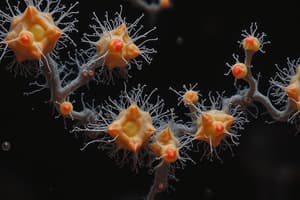Podcast
Questions and Answers
Which of the following is a type of unicellular prokaryote?
Which of the following is a type of unicellular prokaryote?
- Protozoa
- Yeast
- Algae
- Bacteria (correct)
What type of microorganism is primarily responsible for oxygen production in aquatic environments?
What type of microorganism is primarily responsible for oxygen production in aquatic environments?
- Protozoa
- Algae (correct)
- Bacteria
- Fungi
Which of the following metabolic processes occurs in the absence of oxygen?
Which of the following metabolic processes occurs in the absence of oxygen?
- Anaerobic respiration (correct)
- Photosynthesis
- Fermentation (correct)
- Aerobic respiration
What is the primary role of antibiotics in medical microbiology?
What is the primary role of antibiotics in medical microbiology?
Which microorganism is classified as acellular and requires a host to replicate?
Which microorganism is classified as acellular and requires a host to replicate?
Which branch of microbiology focuses on organisms that cause diseases?
Which branch of microbiology focuses on organisms that cause diseases?
What process involves the breakdown of organic substrates in the absence of oxygen?
What process involves the breakdown of organic substrates in the absence of oxygen?
Which of the following techniques is NOT typically used in microbiology?
Which of the following techniques is NOT typically used in microbiology?
Which type of microorganism can cause infections, such as those caused by Candida?
Which type of microorganism can cause infections, such as those caused by Candida?
Which metabolic pathway requires oxygen for efficient energy production?
Which metabolic pathway requires oxygen for efficient energy production?
Flashcards are hidden until you start studying
Study Notes
Overview of Microbiology
- Microbiology is the study of microorganisms, which include bacteria, viruses, fungi, protozoa, and algae.
- It encompasses various branches such as virology, bacteriology, mycology, and parasitology.
Types of Microorganisms
-
Bacteria
- Unicellular prokaryotes.
- Can be beneficial (e.g., gut flora) or pathogenic (e.g., Streptococcus).
- Classified by shape: cocci (spherical), bacilli (rod-shaped), spirilla (spiral).
-
Viruses
- Acellular and require a host to replicate.
- Composed of DNA or RNA surrounded by a protein coat.
- Cause diseases such as influenza, HIV, and COVID-19.
-
Fungi
- Eukaryotic organisms, which include yeasts and molds.
- Important in fermentation and decomposition.
- Can cause infections (e.g., Candida).
-
Protozoa
- Unicellular eukaryotes.
- Most are free-living, while some are parasitic (e.g., Plasmodium causes malaria).
-
Algae
- Photosynthetic eukaryotes, primarily aquatic.
- Important for oxygen production and as a food source.
Microbial Metabolism
- Microorganisms exhibit diverse metabolic pathways:
- Aerobic respiration: Requires oxygen (e.g., many bacteria).
- Anaerobic respiration: Occurs without oxygen (e.g., some bacteria and archaea).
- Fermentation: Breakdown of organic substrates in the absence of oxygen (e.g., lactic acid fermentation).
Importance of Microbiology
- Medical Microbiology: Understanding pathogens aids in disease prevention and treatment.
- Environmental Microbiology: Microorganisms play a role in nutrient cycling and bioremediation.
- Industrial Microbiology: Used in the production of antibiotics, vaccines, and fermented foods.
Techniques in Microbiology
- Culturing: Growing microorganisms in a controlled environment (e.g., agar plates).
- Staining: Methods like Gram staining to differentiate bacteria.
- Molecular techniques: PCR and sequencing for identifying and studying microbes.
Pathogenic Microbiology
- Study of microorganisms that cause diseases:
- Mechanisms of pathogenicity (e.g., toxins, adherence).
- Host immune responses and evasion strategies.
- Epidemiology and control measures.
Antimicrobials
- Antibiotics: Substances that inhibit bacterial growth (e.g., penicillin).
- Antivirals: Target viral replication processes.
- Antifungals: Used to treat fungal infections.
Safety and Handling
- Biosafety Levels (BSL): Classify microorganisms based on risk to human health (BSL-1 to BSL-4).
- Personal protective equipment (PPE) is essential in laboratory settings.
Current Trends and Research
- Microbiome studies explore the role of microbiota in human health.
- Advances in genetic engineering and synthetic biology.
- Focus on antimicrobial resistance and development of new therapies.
Microbiology
- The scientific study of microorganisms, including bacteria, viruses, fungi, protozoa, and algae.
- Has various branches like virology, bacteriology, mycology, and parasitology.
Types of Microorganisms
- Bacteria are unicellular prokaryotes that can be beneficial or harmful.
- Classified based on shape: cocci (spherical), bacilli (rod-shaped), and spirilla (spiral).
- Viruses are acellular entities that require a host to survive and replicate.
- Composed of DNA or RNA surrounded by a protein coat.
- Cause diseases like influenza, HIV, and COVID-19.
- Fungi, a group of eukaryotic organisms including yeasts and molds, are important in fermentation and decomposition.
- Can cause infections like Candida.
- Protozoa are unicellular eukaryotes, mainly free-living but some are parasitic.
- For example, Plasmodium causes malaria.
- Algae are photosynthetic eukaryotes, primarily found in aquatic environments.
- Important for oxygen production and a food source.
Microbial Metabolism
- Microorganisms utilize diverse metabolic pathways:
- Aerobic respiration: Requires oxygen, found in many bacteria.
- Anaerobic respiration: Occurs without oxygen, found in some bacteria and archaea.
- Fermentation: Breakdown of organic substrates in the absence of oxygen, e.g., lactic acid fermentation.
Importance of Microbiology
- Medical microbiology: Understanding pathogens aids in disease prevention and treatment.
- Environmental microbiology: Microorganisms play a crucial role in nutrient cycling and bioremediation.
- Industrial microbiology: Used in the production of antibiotics, vaccines, and fermented foods.
Techniques in Microbiology
- Culturing: Growing microorganisms in controlled environments like agar plates.
- Staining: Methods like Gram staining differentiate bacteria.
- Molecular techniques: PCR and sequencing for identifying and studying microbes.
Pathogenic Microbiology
- Focuses on microorganisms that cause diseases.
- Mechanisms of pathogenicity, such as toxins and adherence.
- Host immune responses and evasion strategies.
- Epidemiology and control measures.
Antimicrobials
- Antibiotics inhibit bacterial growth, an example is Penicillin.
- Antivirals target viral replication processes.
- Antifungals used to treat fungal infections.
Safety and Handling
- Biosafety Levels (BSL) classify microorganisms based on their risk to human health (BSL-1 to BSL-4).
- Personal protective equipment (PPE) is crucial in laboratory settings.
Current Trends and Research
- Microbiome studies: Exploring the role of microbiota in human health.
- Genetic engineering and Synthetic biology: Advancements in these fields are impacting microbiology.
- Antimicrobial resistance: A focus on understanding and combating antimicrobial resistance.
- New Therapies: Development of novel therapies for infectious diseases.
Studying That Suits You
Use AI to generate personalized quizzes and flashcards to suit your learning preferences.




